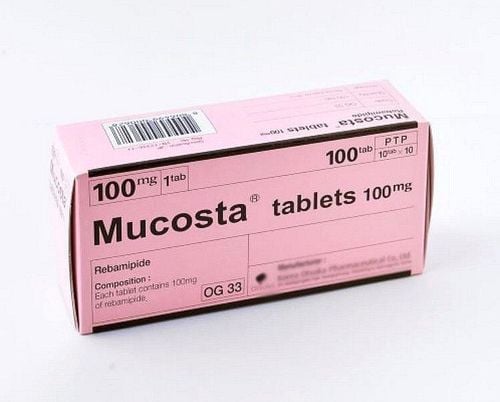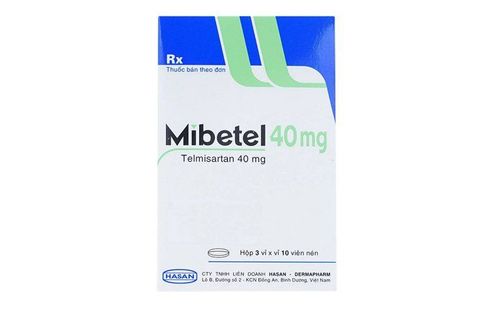This is an automatically translated article.
Kapedone is a brand name drug used for gastrointestinal diseases. When using Kapedone you should talk to your doctor about your illness and condition. Here are some shared information to help readers understand what Kapedone does and how to use it effectively.1. What effect does Kapedone have?
Kapedone has the main active ingredient Domperidone maleate. Used specifically to treat diseases of the digestive tract. This active ingredient includes an anti-vomiting agent. According to research, the effects of Kapedone are not harmful to the brain leading to neurological disease.When Kapedone affects the rate of peristalsis of the gastrointestinal tract, it can affect the heart, causing achalasia or an increase in the degree of pylorus after eating. Kapedone plasma concentrations usually peak 30 minutes after administration. The amount of drug absorbed is metabolized by the liver, then transported and excreted through the excretory system.
Based on the above uses, it can be seen that Kapedone should not be used on your own without the permission of a qualified doctor. You need to consult your doctor before using it. Here are some situations that need attention that may be indicated to use Kapedone for treatment:
Patients with nausea or vomiting People with loss of appetite People with bloating and gas Patients with indigestion Patients heartburn or belching Patients with chronic gastritis Patients with gastric prolapse Patients taking anticancer drugs or L-dopa Children vomiting at certain times Children with respiratory tract infections. If you fall into the prescribed cases to use the drug, you can tell your doctor. In some situations, the doctor will not prescribe the order when the patient has special symptoms. Always find out what Kapedone does before using it to avoid health risks.
2. Dosage and how to take Kapedone
Kapedone is made in the form of tablets for oral use. Each disease has its own uses. However, patients need to be instructed and specified by a doctor before using it to avoid the risk of effects due to improper use of drugs or overdose of prescribed drugs.
Usually, Kapedone will divide the dose according to the actual condition of the patient. In some cases, the use of drugs according to age is appropriate for health. You can refer to some of the doses of Kapedone below to easily discuss with your doctor when you are prescribed and directed to take Kapedone.
Treatment of problems caused by vomiting or nausea should use 10-20mg of the drug. These doses will be spaced about 4 to 8 hours apart and should be used in adult patients. Children are given the same dose at the same time, but the amount is calculated by weight. Children will be given a dose of 0.2 - 0.4mg/kg. Patients present with dyspepsia, which usually occurs in adults. Therefore, if the patient is from 18 years old, the dose will be 10-20mg each time and 3 times a day before meals. The final dose should be taken before the evening meal and should not be taken for longer than 3 months. Young children are the object of drug use should be concerned. You should note that children should not self-medicate without being prescribed. Children can be at risk of overdose, so check with your doctor before giving it. Because Kapedone inhibits vomiting, caution should be taken not to use prophylactically in patients who have recently undergone surgery.
If you use the drug has unusual symptoms or does not work, please inform your doctor. At the same time, remember to regularly check your health as directed and requested by your doctor. Medical developments can inadvertently cause an overdose problem if the amount of medication required is reduced from the original dose.
3. Notes before taking Kapedone
Kapedone is an antiemetic product that prevents nausea but still has the potential for allergic reactions after use. Patients should actively check the ingredients of Kapedone before taking it to prevent the risk of allergic reactions. Also be extra careful when you have a history of drug allergies or allergies to drugs with the same effect.
With the group of drugs with risk of allergy or determining the equivalent drug that has ever been allergic, it will be contraindicated to use. In case you take Kapedone and appear to interact, please notify your doctor as soon as possible to change and monitor your health in time. In addition, you should note a number of contraindications to the use of Kapedone to avoid:
Patients with a history of or are suffering from gastric or peri-gastrointestinal bleeding syndrome Patients with mechanical syndrome Patients at risk or have experienced intestinal perforation Patients with tumors in the pituitary gland that secrete prolactin Some patients with impaired liver and kidney health are not contraindicated for use if it is mild and moderate. However, it is advisable to check and monitor regularly if the doctor prescribes medication to avoid affecting the functioning of the weakened organs.
4. Side effects of the drug Kapedone
Headaches Drowsiness Frequent stress and psychological pressure Rash causing itching on the skin Symptoms of a short-term allergic reaction Stimulates the mammary glands to increase lactation Increased abnormal breast size for men Pain and difficulty Suffering from chest tightness Dry mouth Or thirst Effects on liver and kidney function Frequent abdominal muscle cramps Present or confirm it is a diarrhea syndrome Side effects of Kapedone can be serious Weight can also temporarily throw the patient off balance. Each side effect has its own dangers you should not be too worried about. Always remember to regularly check your health and consult your doctor when you have different health symptoms than usual.
5. Interaction with drugs Kapedone
How Kapedone interacts when used with certain drugs. If you are taking some of the following medicines, please inform your doctor about them as they will affect the effects of Kapedone if used together:
Ketoconazole Drugs that cause inhibition of CYP 3A4 ACE inhibitors muscle relaxant Muscarinic Bromocriptine Pain reliever in the opipod group Famotidine Cimetidine Ranitidine Nizatidine Lithium In addition to drugs that have been identified to affect and interact with Kapedone you should pay attention to all other drugs when needed together. Ideally, you need to notify your doctor when you are prescribed Kapedone so that the doctor can guide and adjust the appropriate use to avoid unwanted interactions.
Kapedone drug interactions may occur with food. Even when the state of health is not good or an organ failure is affected. Therefore, drug interactions need to be detected early to handle. Therefore, you should actively discuss with your doctor for instructions to support and monitor your health during treatment with Kapedone.
Kapedone is used to treat diseases of the gastrointestinal tract, not necessarily the disease in the gastrointestinal tract. Some non-indications can be researched or discovered by patients after use. To ensure the safety of the health of patients and doctors, both need to know what Kapedone drug works for.













